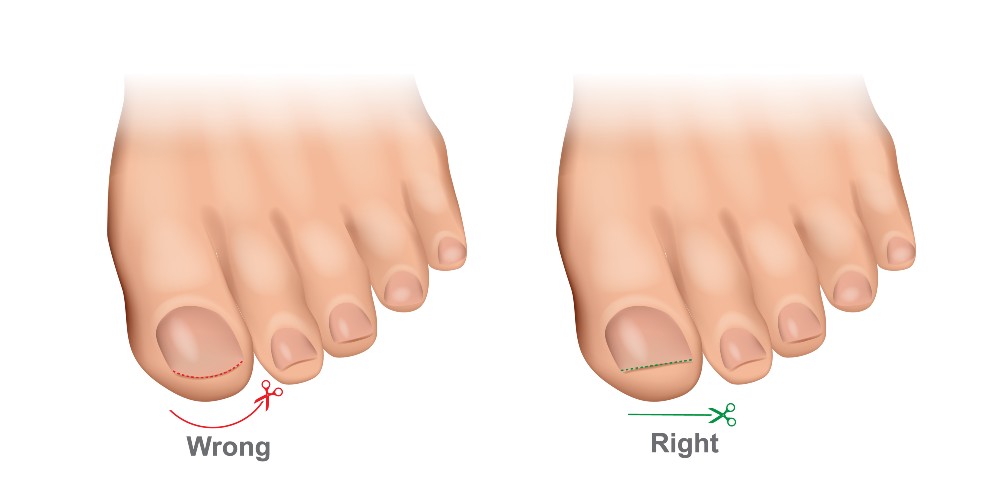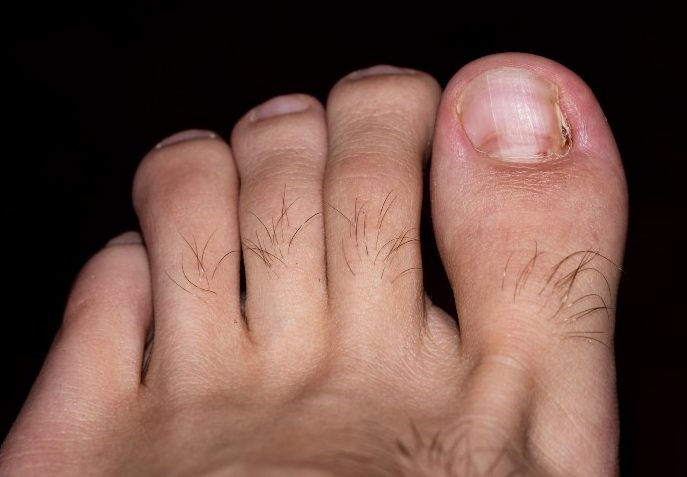Ingrown Toenails
One of the most common, and uncomfortable, issues with our feet are ingrown toenails. Follow this guide to know how best to deal with them and avoid further complications such as an infection.
What is an Ingrown Toenail?
Ingrown toenails are a common condition where toenails grow into the soft flesh at the corner and side of the toe. Pain, swelling from inflammation and frequent infection can result. Ingrown toenails usually affect the big toe, although the smaller toes can also develop this problem.
Being diabetic or having a condition that impairs blood flow to your feet puts you at a greater risk of complications from ingrown toenails. This means that if you have one of these conditions, you need to be seen by our podiatrists as soon as possible!
Related Conditions
What Causes Ingrown Toenails?
Ingrown toenails may result from improperly trimming your toenails so that sharp edges pierce the skin around the toe and continue growing. Another cause of ingrown toenails is from wearing ill-fitting or tight-fitting shoes. Other causes include a curved growth pattern of the nail itself or an injury or trauma to the toe that damages the nail.
Ingrown Toenail Symptoms
Ingrown toenails present with pain and redness around the toenail, and sometimes have swelling of the toe around the nail. If the injury becomes infected, there can be the presence of puss or drainage under the skin. The pain will also be increased and make it difficult to go about your daily life. Even just walking and standing can become too painful with an infected ingrown toenail as just putting weight on it hurts.
If left untreated, an ingrown toenail is likely to develop an infection and may even require surgery to remove the nail.
Treatment Options For Ingrown Toenails
When ingrown toenails first start to develop, there are some things you can do to try and fix them. However, if caring for your ingrown toenail at home is not solving the problem, you should come into our office to see our podiatrists.
Home Remedies
It is possible to care for minor ingrown toenails on your own. You can do this by:
- Soaking the foot in warm water.
- Keeping the area clean.
- Applying antibiotic cream to the area.
- Wrapping the toe in gauze or bandages.
- Wear sensible footwear that is not too tight on your toes.
- Take pain relievers to ease your discomfort.
However, if there are signs of an infection, such as pus, or if you have diabetes or another disorder that interferes with circulation or immune response, you need to consult with our podiatrists as soon as possible. Our podiatrists will provide the following treatments.
Lifting The Nail
The ingrown nail is carefully lifted at the edge and placed cotton, dental floss, or a splint under it. This will raise the nail from the skin and help it grow properly.
Partial Removal Of The Nail
For more severe cases, the ingrown portion of the nail may be removed to eliminate the infection. Removal of an ingrown portion may be partial or complete and is performed under local anesthetic. This outpatient procedure is done right in our office, so you do not have to go to the hospital at all.
Removing The Nail And Tissue
For a recurrent ingrown toenail, a portion of the nail and the underlying tissue forming the nail bed may be removed. Our podiatrists might put a chemical on the nail bed or use a laser where the nail has been removed to prevent that part of the nail from growing back into yet another ingrown toenail. The procedure is also performed under local anesthetic right in our clinic.

How To Prevent Ingrown Toenails
Ingrown toenails can be prevented by trimming your nails straight across and keeping them at a moderate length. Make sure your shoes fit properly and do not place your toes under pressure. Wear protective footwear if your activities put your toes at risk of trauma. You should also check your feet daily for symptoms, especially if you have diabetes. Patients with diabetes and other underlying conditions that put them at greater risk for infection or complications should visit our office for regular check-ups to keep their feet from major complications.
We Can Help You With Your Ingrown Toenails!
Need help with ingrown toenails or any other foot and ankle issue? Contact us today by calling (949) 364-9255 or by filling out our online form to book an appointment for a proper examination and diagnosis. Let our amazing team of foot care specialists take care of you!
Contact Us
Robert Spencer, DPM
Nitza Rodriguez, DPM
Mario Porciello, DPM
Map & Directions
333 Corporate Drive, Suite 230, Ladera Ranch, CA 92694
Tel: (949) 364-9255 (WALK)
Fax: (949) 364-9250
Office Hours:
Monday - Friday: 9am - 5pm
*(Lunch 12 noon - 1pm)

